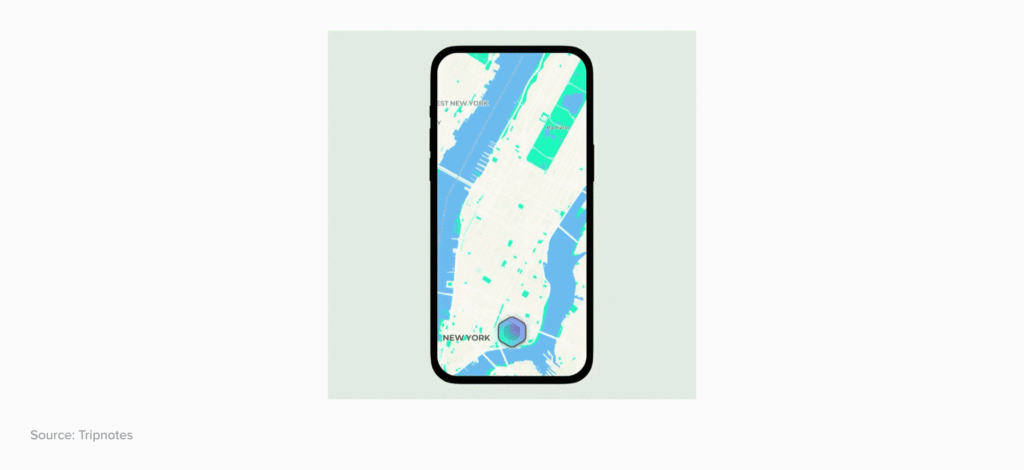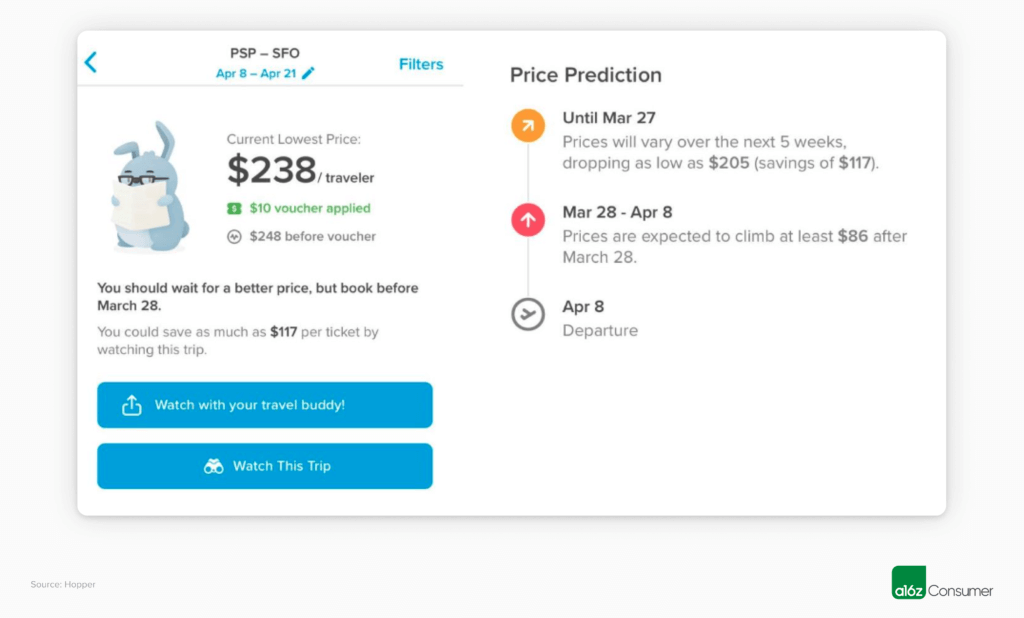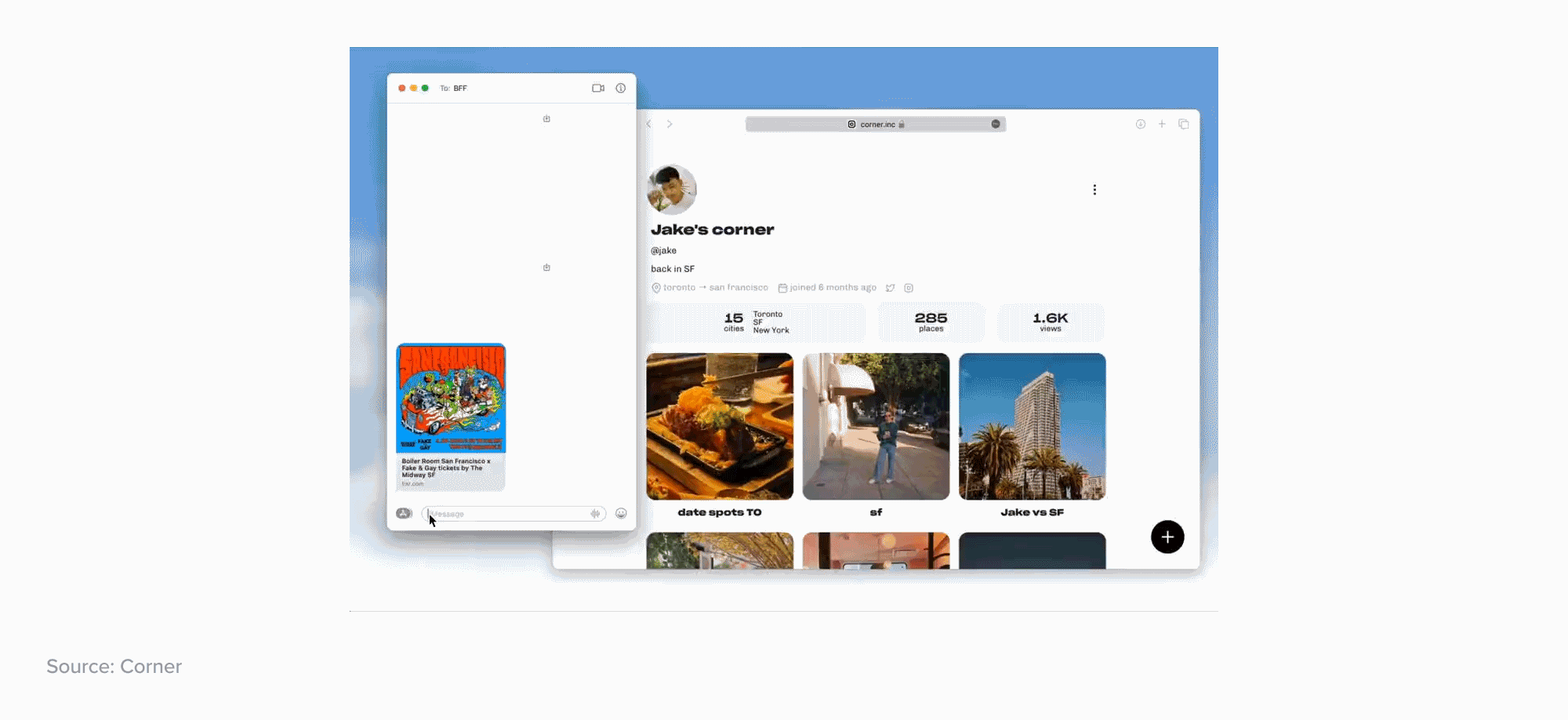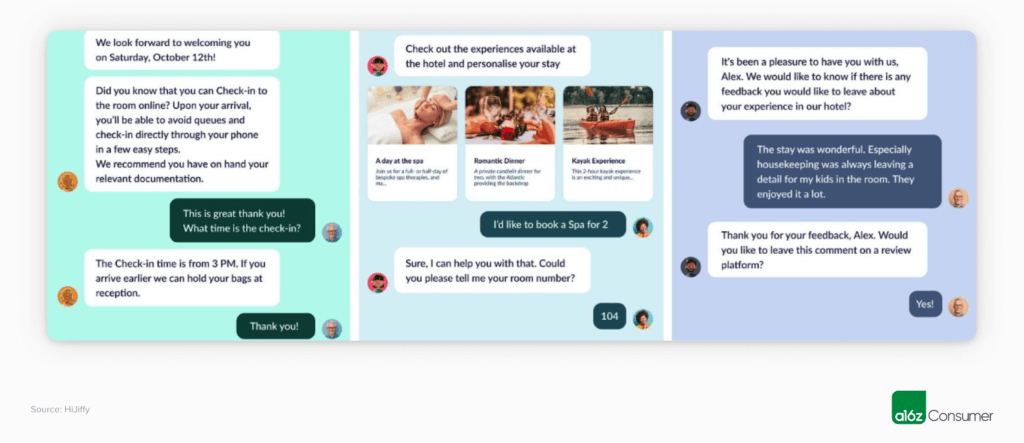 Travel is a trillion-dollar industry stuck in the past. The last major breakthrough came in the 1990s, with the emergence of online travel agencies (OTAs) like Booking.com and Expedia to aggregate inventory. Unless you hire a travel agent, planning is still a manual and time-intensive process—until now.
Travel is a trillion-dollar industry stuck in the past. The last major breakthrough came in the 1990s, with the emergence of online travel agencies (OTAs) like Booking.com and Expedia to aggregate inventory. Unless you hire a travel agent, planning is still a manual and time-intensive process—until now.
We believe that the travel industry is perfectly positioned to ride the wave of AI. There’s a wealth of public data on almost every destination, form of transportation, restaurant, and activity. This data also includes objective facts like hours, pricing, and location, as well as opinions or tips from reviews (e.g., “This restaurant isn’t good for kids under 5”).
Then there is your own private data on how you like to travel (window or aisle seat?), where you’ve already been, and your favorite destinations or experiences. Combine this public and private information, and you have an exceptional dataset to power future recommendations that are customized to each individual. Generative AI unlocks the ability to converse with this data, drawing out insights and suggestions.
In the coming months, we expect to see a wave of startups leveraging AI to make the travel experience more personalized, efficient, and enjoyable. Below, we’ll outline some of the use cases we’ve been thinking about.
TABLE OF CONTENTS
Using AI for Inspiration
TABLE OF CONTENTS
Sometimes the hardest part of planning a trip is choosing where (and when) to go. Imagine typing a request in natural language—”two-week summer beach trip within driving distance that costs less than $1,000″—and getting a curated list of destinations. We’ve already seen some early examples of this in tools like Where To and BetterTravel.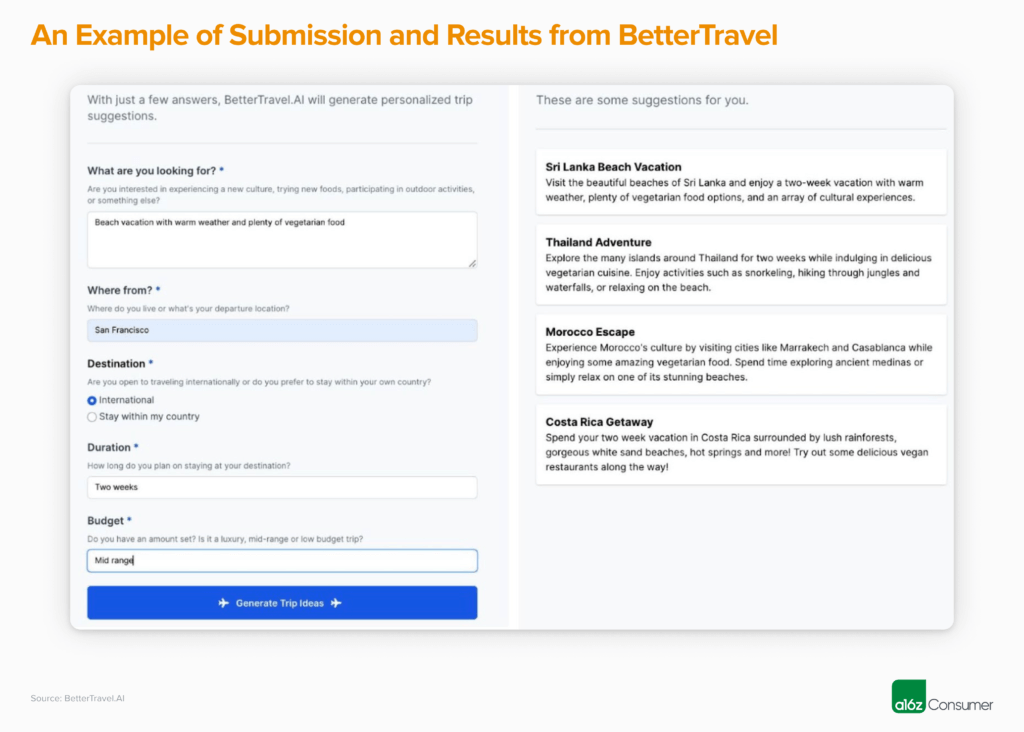
The products are basic today, but we expect they’ll become full-featured and interactive. For each trip option, you’ll be able to see why it’s recommended, ask questions, and browse content or reviews from other travelers. It will be a much more conversational and personalized experience than reading a blog post or “listicle” to choose your next vacation destination.
As these tools become more advanced, we also expect them to tap into your personal data, which is not as scary as it might sound. Why shouldn’t a travel app connect to your calendar to understand where you’ve already visited, or to find the least busy week for you to take a trip?
Eventually, these tools may become proactive. Imagine an “always on” chatbot that’s constantly scanning for opportunities that match your preferences and calendar. It could make smart recommendations like “Tack on two days of skiing at the end of your work trip for $500,” or even “Three of your closest friends are free the same weekend, here’s a trip idea.”
TABLE OF CONTENTS
TABLE OF CONTENTS
Using AI for Itinerary Planning
Once you’ve picked where to go, it’s time to set an itinerary. There’s no way you can scan all of the options for activities and dining, and read every online review, but an AI can! With a bit of guidance about the kind of trip you’re looking for—”I am not a morning person, I want to go out to eat twice a day, and I’m hoping to avoid large tourist groups”—AI tools can build a custom itinerary.
People are already using ChatGPT for itineraries and the results are surprisingly strong. We’ve also seen a number of tools that move further into AI-assisted planning; websites like Roamr and apps like Tripnotes pull in more dynamic content sourced from sites like Yelp and TripAdvisor to present itineraries.
It’s worth noting that products in this space will need to tackle the “correctness” issue—models sometimes hallucinate (e.g., recommending a restaurant that doesn’t exist) or serve outdated information. We see a few potential solutions here:
-
- After receiving a recommended itinerary from a model, the product could have built-in checks to ensure accuracy before delivering it to the consumer.
- We may also see the emergence of purpose-built models trained on a limited data set that are more restricted and can’t make up information.
- Generated itineraries could be published to a broader community (e.g., all of the users on the app) for validation, and the resulting data of up and down votes could be used to fine tune the model.
Beyond users validating each other’s itineraries, we expect many of these products will have social features. We can imagine a world where you can duplicate another user’s AI or human-generated itinerary and either use their exact trip or customize it; for example, “Take tripexpert489’s plan and make it gluten free-friendly.”
TABLE OF CONTENTS
TABLE OF CONTENTS
Using AI for Booking
When you’ve set your itinerary and are ready to book, AI assistants can optimize the process. As we’ve seen with tools like Hopper and Google Flights, it’s now possible to estimate future prices and recommend the best time to book.
The next problem to solve here is booking automation. What if a tool could make bookings for you? At first, any booking bot will likely need significant guidance (e.g., “book this specific hotel for these specific dates”) as well as human approval before making the purchase. However, we expect these bots will become more autonomous over time and eventually capable of working with more flexible guidelines (e.g., “find the cheapest aisle seat on any red-eye that gets me to my destination on time”).
AI tools also can scrape the internet to find the best place to book: should you go directly to the vendor’s website, or is an aggregator offering a discount? Are there any coupon codes or discounts you should know about? These tools can also automate anything conversational, from inquiring about long-stay discounts to requesting an upgrade or asking questions about amenities.
TABLE OF CONTENTS
Using AI While on the Trip
TABLE OF CONTENTS
AI assistance doesn’t end once you’ve booked the trip. The joy (and challenge) of travel is that it’s dynamic. Plans change: you decide to sleep in, it starts raining, or the place you wanted to visit is unexpectedly closed. What if you need to change your itinerary or need a last-minute recommendation?
We expect that AI tools will accompany travelers on their trips, adjusting plans when needed and automatically canceling or booking reservations. If the product knows where you’re going and when, it can collect feedback to improve future recommendations. With a few words about the experience, AI can even generate full reviews in the user’s voice to post publicly, feeding the dataset for other consumers.
One early example of an AI-powered travel assistant is Corner, a curation app that allows users to make and share lists of their favorite places. It recently launched a feature that uses GPT to pull destinations from text and map them—perfect for travelers who want to incorporate recommendations from friends!
And whether or not you consider “travel vlogging” to be cringe, it’s impossible to deny that people like to document their trips. AI tools can automate the process of creating short and long-form video, photo galleries, text and photo reviews, and more from your itinerary and phone camera roll. Whether you’re sharing this content on social media or keeping it for yourself, it’s nice to have an AI travel companion that can curate your memories and recommendations.
TABLE OF CONTENTS
TABLE OF CONTENTS
Business Use Cases
We’ve been talking about leisure travel, but there’s also a significant opportunity to apply AI in more business-oriented use cases.
Employees traveling for work need to book flights, hotels, rental cars, and restaurants; AI assistants can understand your company’s policies and recommend the best options. We’ve already seen Navan (fka TripActions) announce that it will be integrating ChatGPT capabilities to create a more conversational booking process that generates a suggested itinerary based on your saved preferences and your employer’s guidelines.
Finally, we expect to see travel and hospitality businesses that leverage AI to supercharge their productivity and reach new customers. There are already numerous AI-powered products that help small businesses answer customer queries, create marketing content, design websites, and more.
A new class of travel-specific products has started to emerge. Hotels are using AI-powered tools like HiJiffy, Allora, and Aiello to communicate with guests and even upsell them on additional services like spa treatments, dinner reservations, or outdoor activities. A hotel that fully runs its back office (or even front desk) with AI might be coming soon.
Thanks for reading! If you’re building a product at the intersection of AI and travel, we’d love to hear from you—reach out to Bryan (bryan@a16z.com) and Justine (jmoore@a16z.com).

